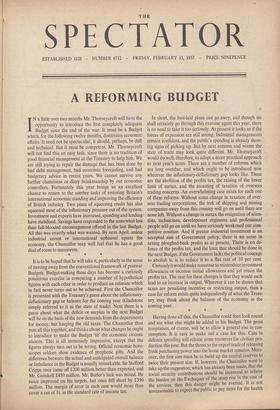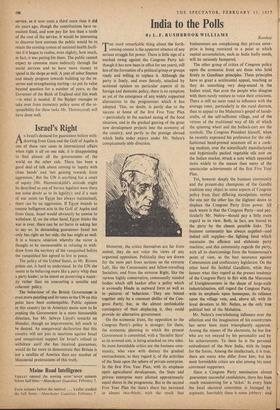A REFORMING BUDGET
IN a little over two months Mr. Thorneycroft will have the opportunity to introduce the first completely adequate Budget since the end of the war. It must be a Budget which, for the following twelve months, dominates economic affairs. It need not be spectacular, it should, perhaps, be dull and technical. But it must be competent. Mr. Thorneycroft will not find this an easy task, since there is no tradition of good financial management at the Treasury to help him. We are still trying to repair the damage that has been done by bad debt management, bad economic forecasting, and bad budgetary advice in recent years. We cannot survive any further clumsiness or dizzy brinkmanship by our economic controllers. Fortunately this year brings us an excellent chance to return to the sombre tasks of restoring Britain's international economic standing and improving the efficiency of British industry. Two years of squeezing credit has also squeezed most of the inflationary pressure out of the system. Investment and exports have increased, spending and lending have stabilised. Savings have responded to the somewhat less than full-blooded encouragement offered in \ the last Budget. All this was exactly what was wanted. By next April, unless industrial unrest or international upheaval upsets the economy, the Chancellor may well feel that he has a good deal of room to manoeuvre.
* * * It is to be hoped that he will take it, particularly in the sense of moving away from the conventional framework of postwar Budgets. Budget-making these days has become a curiously ponderous exercise in comparing a number of hypothetical figures with each other in order to produce an estimate which in fact never turns out to be achieved. First the Chancellor is presented with the Treasury's guess about the inflationary- deflationary gap or balance for the coming year (Gladstone simply referred to it as the state of trade). Next there is a guess about what the deficit or surplus in the next Budget will be on the basis of the new demands from the departments for money, but keeping the old taxes. The Chancellor then puts all this together, and thinks about what changes he ought to introduce to make the Budget 'fit' the economic circum- stances. This is all immensely impressive, except that the figures alwajs turn out to be wrong. Official economic horo- scopes seldom show evidence of prophetic gifts. And the difference between the actual and anticipated overall balance or imbalance in the Budget is usually remarkable. Sir Stafford Cripps once came off £200 million better than expected, and Mr. Gaitskell £450 million. Mr. Butler's luck was mixed. He twice improved on his targets, but once fell short by £350 million. The margin of error in each case would more than cover a cut of ls. in the standard rate of income tax. In short, the best-laid plans can go awry, and though we shall certainly go through this exercise again this year, there is no need to take it too seriously. At present it looks as if the forces of expansion are still strong. Industrial managements remain confident, and the public's spending is already show- ing signs of picking up. But by next autumn and winter the state of trade may look quite different. Mr. Thorneycroft would do well, therefore, to adopt a more practical approach to next year's taxes. There are a number of reforms which are long overdue, and which ought to be introduced now whatever. the inflationary-deflationary gap looks like. These are the abolition of the profits tax, the raising of the lower limit of surtax, and the recasting of taxation of overseas trading concerns. An overwhelming case exists for each one of these reforms. Without some change in taxation of over- seas trading corporations, the trek of shipping and mining companies away from this country will go on until there are none left. Without a change in surtax the emigration of scien- tists, technicians, development engineers and professional • people will go on until we have seriously weakened our com- petitive position. And if greater industrial investment is an accepted aim of Government policy, there is no sense in taxing ploughed-back profits as at present. There is no de- fence of the profits tax, and the least that should be done in the next Budget, if the Government lacks the political courage to abolish it, is to reduce it to a flat rate of 10 per cent.
Certainly it would make nonsense to reintroduce investment allowances or increase initial allowances and yet retain the profits tax. The case for these changes is that they would each lead to an increase in output. Wherever it can be shown that taxes are penalising incentive or restricting output, then a case for reform exists quite independently of what the Treas- ury may think about the balance of the economy in the coming year.
* * *
Having done all this, the Chancellor could then look round and see what else might be added to his Budget. The great temptation, of course, will be to allow a general rise in con- sumption. It is easy to make old a case for this. Cuts in defence spending will release some resources for civilian pro- duction this year. But the threat to the export trade of releasing fresh purchasing power into the home market remains. More- over, the first aim must be to build up the central reserves to twice their present size. If, however, the Chancellor were to take up the suggestion, which has already been made, that the social security contributions should be increased to relieve the burden on the Exchequer of the steep rise in the cost of the services, then this danger might be averted. It is not unreasonable to expect the public to pay more for the health
service, as it now costs a third more than it did six years ago, though the contributions have re- mained fixed, and now pay for less than a tenth of the cost of the service. It would be interesting to discover how anxious the public would be to retain the existing system of national health facili- ties if it began to realise, even slightly, how much, in fact, it was paying for them. The public cannot expect to consume more indirectly through the social services and to have more money to spend in the shops as well. A year of sober finance and steady progress towards building up the re- serves and strengthening sterling—to put its value beyond question for a number of years, as the Governor of the Bank of England said this week —is what is needed. If the Budget manages to take over from monetary policy some of the re- sponsibility for these tasks Mr. Thorneycroft will have done well.



































 Previous page
Previous page